Public Forum Report
Feb. 10, 2011
日本語ページへ
Public Forum "Disaster Relief and International Cooperation" Program
Disaster Relief and International Cooperation
| [Date & Venue] | December 10th (Sat) 15:00-17:00, International House of Japan |
| [Host] | PARI of the University of Tokyo |
| [Sponsored by] | The Japan Foundation / MacArthur Foundation |
| [Supported by] | The International House of Japan |
| *The Japan Foundation sponsors the preparation committee for 2011 Five University Network Workshop. | |
Program
| 14:30 --Registration-- | ||
|---|---|---|
| 15:00 --Opening Remarks-- | ||
| Akihiko Tanaka Hideaki Shiroyama | Vice Dean, the University of Tokyo Director, PARI, the University of Tokyo | |
| 15:10-17:00 --Key Note Speech- | ||
| Shin'ichi Kitaoka | Professor, the University of Tokyo (Ex-Ambassador to the UN) | |
| --Presentation-- | ||
| Noriyuki Shikata Goro Matsumura Yoshinori Suematsu Shozo Azuma | Deputy Cabinet Secretary for Public Relations, Cabinet Office Director, Personnel Department, Ground Staff Office, Ministry of Defense Special Advisor to the Prime Minister, Member, House of Representatives Member of the House of Representatives, Chairman, Standing Committee on Security | |
| --Comment- | ||
| Gilbert Rozman | Professor, Princeton University | |
Overview
The aim of this forum was to discuss "Disaster Relief and International Cooperation." The devastating earthquake and Tsunami of March 11, 2011, was also an experience where the good will of international society, from U.S., China, to Afghanistan, was extended to the victim. We discussed what the lessons from the aftermath of 3.11 are, and what we can do now to make better changes.
This public forum was held at adjunct to the annual five university conference with scholars from Princeton University, Peking University, Korea University, National University of Singapore, and the University of Tokyo.
International Cooperation and Its Challenge
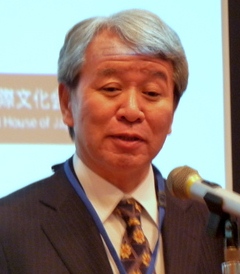
At the opening remarks, Prof. Akihiko Tanaka, Vice Dean of the University of Tokyo expressed gratitude and welcome to the participants and sponsors. Maritime research institute of the University of Tokyo has experienced Tsunami disaster on March 11th, which destroyed the entire city of Otsuchi, its hometown. Prof. Tanaka and Prof. Shiroyama, director of PARI, both stressed the importance of this public forum to think about the 3.11 and its aftermath, and introduced various efforts by the University of Tokyo.
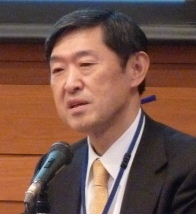
In the key-note speech, Prof. Shin'ichi Kitaoka talked about the overwhelming supports from various countries/regions and their impact on the future of international cooperation. Given his past experience as Japanese Ambassador to the UN to tackle with the international cooperation in times of challenge, he stressed that the international cooperation is not an easy job at all, since it requires efforts and abilities from both sides. He concluded the main challenges of Japanese government were how quickly release and convey all the information to the nation in order to win the public trust, and also the effective cooperation with international community and organizations such as IAEA.
Challenge in Public Relations
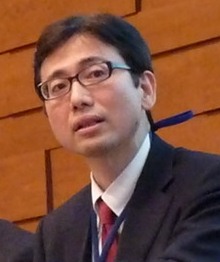
The international community conveyed strong sympathy and support to Japan on 3.11, but also there felt fears due to the nuclear reactor accident. In the following panel discussion, first Mr. Noriyuki Shikata, Deputy Cabinet Secretary for Public Relations in Cabinet Office gave a speech on his experience shortly after 3.11 as a person who was in charge of international communication. Japan traditionally tends to lack the efforts for better international communication. Mr. Shikata, with quite limited human resource in his office, tried to increase positive stories and decrease negative stories on Japan after 3.11, in which he eventually succeeded. The lesson learned is transparency, accountability, and to develop ability of both domestic and international communications are key to minimize reputational damage and win public support. The main challenge was how to realize both speed and accuracy of information. He also noted that it is very important to share the learning and scientific information of Tsunami in Asia.
SDF's Contribution and International Cooperation
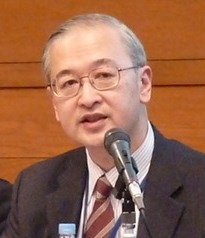
After 3.11, about half of the Self Defense Force of Japan was mobilized to dispatch to Tohoku area in order to rescue people, assist recovery, deal with nuclear accident, and cooperate with military assistance from abroad. Major General Goro Matsumura, from Ground Staff Office shared the experience of SDF on 3.11. US military operation "Tomodachi" was the biggest and most organized support in the history of SDF and Japan-US alliance. Joint Support Force (JSF) which includes the aircraft career, Ronald Regan was organized not only for rescue and recovery missions but also for dealing with the nuclear accident. This is the first case for the actual implementation of the Guidelines for U.S.-Japan Defense Cooperation. Bilateral security cooperation between Australia and Korea also contributed to the rescue operations. According to Maj. Gen. Matsumura, the security cooperation efforts after 3.11 have strong impacts on the wider area of security. Joint military cooperation promotes mutual understanding and transparency, and its experience will play an important role in the future crisis as well, no matter it is military crisis or natural disaster. Maj. Gen. Matsumura concluded that promoting multinational cooperation will strongly improve regional security environment, and that conducting bilateral and multilateral security cooperation at the same time would be most effective.
Future Crisis Management
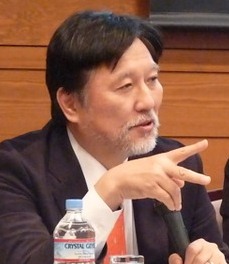
Representative Yoshinori Suematsu, currently Special Advisor to the Prime Minister, focused on the serious long term effect of 3.11 and future measures to prevent such accident. Japan's damage cost caused by misinformation and rumors is already enormous. The actual damage caused by nuclear accident has to be dealt with in such long period of time, and recreating systems and measures to prevent future nuclear accident is of paramount importance. We have to prevent cyber terrorism which has power to shut down all the lifelines, it is a universal problem. In the efforts to redesign the safety and security system in nuclear power plants and lifelines, the existential reasonability must be abandoned. He also pointed out the current Japanese people's distrust for the government, but also said that some of the responsibilities reside in the mass media. Mr. Suematsu concluded with the message calling for worldwide efforts to prevent another nuclear disaster, and Japan's will to share its learning from the accident.
Envisioning Japan's Recovery
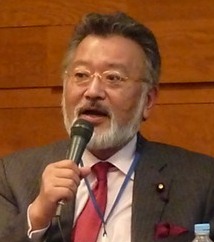
In the last presentation, Representative Shozo Azuma, Chairman of the Standing Committee on Security in the House of Representatives focused on the long term strategy for Japan's recovery from 3.11. Japan's biggest contribution to the international community is to rise up to become a strong country again. Japan has the third largest economy in the world, and is the important part of supply chain in the Asian industry. Given China's rise, it is important Japan plays the role as a major pillar to provide stability in Asia, as the oldest democracy in the region. In order to achieve this goal, Japan has to open its market further to the global players, and strengthen its security policy based on the alliance with US. Dr. Azuma cautioned the view that Japan could enjoy smaller yet matured economy in the coming future. Japan's decline will only provide miserable future in both domestic and international society. He concluded that Japan can be strong through rediscovering its values and principles of sharing rather than fighting each other.
Japan and the International Community
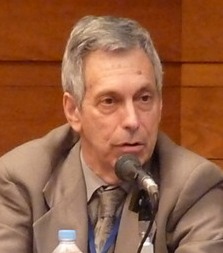
Following the presentations, Prof. Gilbert Rozman at Princeton University briefly commented on Japan's experience of 3.11, and drew learning from it. He suggested that the international society can learn from the disaster to develop the experience to foster international cooperation. In Cold War period, democratic nations have developed cooperation against Soviet threat. Today, not only democratic nations but large part of the world has developed international cooperation to tackle complicated problems such as natural disaster. Given the Japan-US relations reached a higher stage through the cooperation process of Operation Tomodachi, Prof. Rozman stressed the importance to leverage this opportunity to develop international cooperation for security in a broad sense among many countries. He also pointed out that some Chinese media showed the view that 3.11 will foster Japan's decline, and Yomiuri newspaper cautioned that some of the medias in Korea and Russia wrote about anti-Japanese attitudes in their societies, but he wouldn't believe it will come true or be dominant. Prof. Rozman strongly believes that Japan will recover from the disaster, and international cooperation was developed as a whole, in a way that improves the regional security environment. But Japan needs to accelerate its efforts in strengthening its economy and diplomatic influence through fostering free trade and the commitment to the international community.
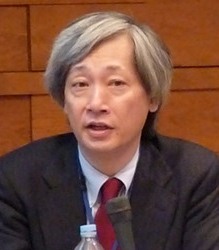
Prof. Kiichi Fujiwara, chairman of the panel, also conveyed gratitude to various countries, regions and people for extending their support for Japan on 3.11 disaster, thus stated Japanese public's image of US has been dramatically improved through Operation Tomodachi and diplomatic support especially contributing Ambassador Roos's prompt and thoughtful approach to Japanese people in Tohoku. In the floor discussion, the scholar from the five university network commented that at that time, shortly after 3.11, Japan's situation was totally a black box to many foreign observers, and asked for the insights for how to deal with massive disaster or accident which manuals or usual procedures cannot be helpful. Given Fukushima accident, each country faces higher risk, more vulnerability of its nuclear power plants. Another scholar was interested if Japanese ODA spending would increase after 3.11, since Japan received so much help from the international community. Other scholar asked how Japanese describe future Japan-China relations, and if 3.11 experience changed Japan's thought.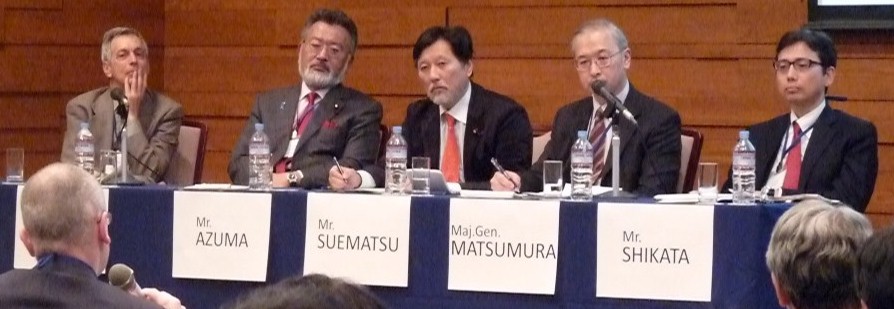 Mr. Suematsu replied first question that the crisis and risk management are two very different things. Since although we all try to lower the risks in peacetime, when crisis breaks out, there would be no manual to follow. He advised that cyber terrorism to nuclear power plant must be the hot topic in coming years among nuclear power producing states. Maj. Gen. Matsumura stated the biggest challenge for force's rescue/ recover operation would be the timing of resuming to the peacetime, or timing of taking over its operation by civil activities. Although Mr. Suematsu suggested ODA spending must decrease at least for a moment, given the financial constraints due to 3.11, Prof. Fujiwara argued that this is the hour for increasing ODA spending. Chairman concluded with highlighting the importance to think about disaster relief and international cooperation, which is important to not only Japan but all over the world.(Lully Miura)
Mr. Suematsu replied first question that the crisis and risk management are two very different things. Since although we all try to lower the risks in peacetime, when crisis breaks out, there would be no manual to follow. He advised that cyber terrorism to nuclear power plant must be the hot topic in coming years among nuclear power producing states. Maj. Gen. Matsumura stated the biggest challenge for force's rescue/ recover operation would be the timing of resuming to the peacetime, or timing of taking over its operation by civil activities. Although Mr. Suematsu suggested ODA spending must decrease at least for a moment, given the financial constraints due to 3.11, Prof. Fujiwara argued that this is the hour for increasing ODA spending. Chairman concluded with highlighting the importance to think about disaster relief and international cooperation, which is important to not only Japan but all over the world.(Lully Miura)


